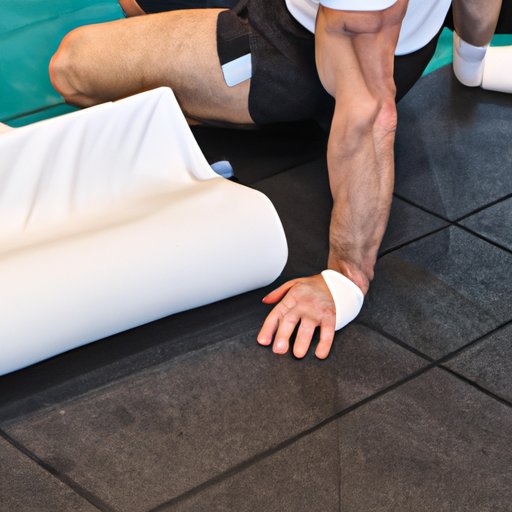Introduction
A sports physical, also known as a pre-participation physical examination (PPE), is a medical evaluation performed by a healthcare professional to assess an athlete’s overall health and physical readiness to participate in sports. It includes a review of the athlete’s medical history and a physical examination.
Sports physicals are essential to ensure that athletes are healthy and able to participate in sports safely. They are a requirement for most organized sports teams, including school sports, recreational leagues, and professional sports organizations.
The Importance of Sports Physicals: What Athletes Need to Know
A sports physical is a vital component of an athlete’s overall health care. It provides an in-depth evaluation of an athlete’s physical health and helps identify any underlying issues that could lead to an injury or decrease performance.
During a sports physical, the healthcare provider will review the athlete’s medical history, including any past injuries or illnesses. They may also ask about family medical history and any medications or supplements the athlete is currently taking. This information helps the healthcare provider understand any medical issues that could impact the athlete’s ability to participate in sports safely.
Following the medical history review, the healthcare provider will perform a physical examination. This includes checking the athlete’s vital signs, evaluating their flexibility, assessing their strength and endurance, and examining their heart, lungs, abdomen, and other vital organs.
Through this examination, the healthcare provider can identify any potential medical concerns that could impact the athlete’s ability to participate in sports safely. They may also identify any physical limitations or imbalances that could lead to an increased risk of injury.
Additionally, a sports physical can help detect medical conditions that may require additional treatment or management. These include asthma, heart conditions, and other chronic medical conditions.
Why Sports Physicals are a Must-Have for Both Competitive and Recreational Athletes
Whether you are a competitive athlete or participate in sports recreation, sports physicals are a must-have to ensure your overall health and safety on the field.
Competitive athletes are at a higher risk of sports injuries due to the intensity and frequency of their training and competition. A sports physical can help identify any risk factors for injuries, such as poor nutrition, inadequate hydration, or improper technique. Early detection and prevention of these risk factors can help prevent injuries and optimize performance.
Recreational athletes who participate in sports for leisure may also benefit from regular sports physicals. These evaluations can help identify any underlying medical conditions, such as high blood pressure or diabetes, that could affect their ability to participate in sports safely.
In both cases, regular sports physicals help ensure athletes are healthy enough to participate in sports and can identify any medical issues or physical limitations that may impact their ability to do so safely and effectively.
Everything You Need to Know About Sports Physicals: A Guide for Athletes and Parents
If you or your child is a part of a sports team, it’s essential to know when and where to get a sports physical.
Sports physicals are typically required before the start of a new sporting season or before joining a new team. They can be conducted by a primary care physician or a healthcare provider specializing in sports medicine.
It’s important to prepare for a sports physical by reviewing medical history and ensuring that any necessary medical documentation, such as immunization records, are up-to-date. Athletes should also bring proper athletic attire and footwear for the physical examination.
During the physical examination, the healthcare provider will evaluate the athlete’s physical health, including their cardiovascular health, musculoskeletal system, and neurological system. The provider will also assess any physical limitations, such as inflexibility or imbalance, that could impact the athlete’s performance or safety.
Depending on the athlete’s medical history and sport, the healthcare provider may order additional tests or evaluations, such as a vision or hearing test, EKG, or X-rays.
Discovering the Benefits of Sports Physicals for the Young and the Old
Sports physicals are essential for athletes of all ages, from young children to older adults.
For younger athletes, sports physicals can help identify any underlying medical conditions or physical limitations that may impact their ability to participate in sports safely. As they grow and develop, sports physicals can help identify any physical imbalances or limitations before they lead to injuries.
For older athletes, sports physicals can help ensure that they are healthy enough to continue participating in sports safely. As athletes age, their activity levels and overall health may change. A sports physical can help identify any age-related medical conditions or physical limitations that may impact their performance or safety.
Sports Physicals: Preventing Injuries, Optimizing Performance, and Ensuring a Safe Sports Season
Sports physicals are an essential tool for preventing injuries, optimizing performance, and ensuring a safe sports season.
By identifying any physical limitations, medical conditions, or risk factors for injuries, healthcare providers can recommend corrective measures that can help prevent injuries and optimize performance. These measures may include changes to an athlete’s nutrition, hydration, or training regimen, or the use of protective equipment or braces.
Additionally, sports physicals can help identify and address any physical limitations that may be hindering an athlete’s performance. By addressing these limitations, athletes can improve their performance and reduce their risk of injury.
Finally, sports physicals help ensure that athletes are healthy enough to participate in sports safely. By detecting any underlying medical conditions, healthcare providers can recommend appropriate treatment or management options that will allow the athlete to participate in sports while minimizing health risks.
Conclusion
Sports physicals are an essential aspect of an athlete’s overall health care. From preventing injuries to optimizing performance, sports physicals provide valuable insights into an athlete’s physical health and readiness to participate in sports safely.
As an athlete or a parent of an athlete, it’s essential to prioritize getting regular sports physicals. By doing so, you can detect any underlying medical conditions or limitations that may impact your ability to participate in sports safely and effectively.
